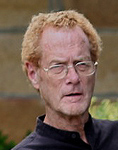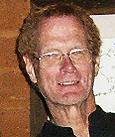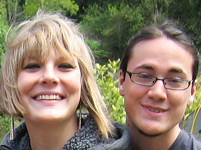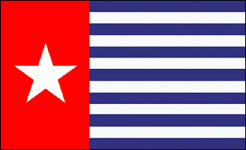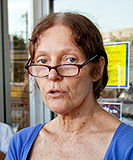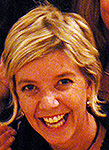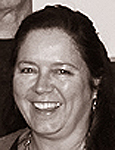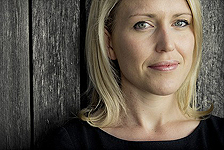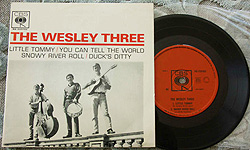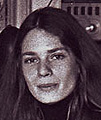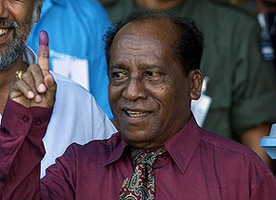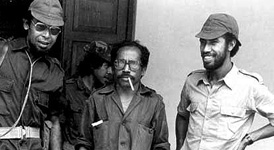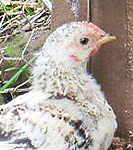|
Martin Wesley-Smith's 2012 BLOG |

1946 the |

1956 perilous |
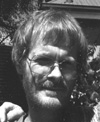
1988 passage |
.gif)
1994 of |

2006 time |
an incomplete, occasional and opinionated ramble through miscellaneous events, performances etc in 2012 ...
current
|
2011
|
2010
|
2009
|
2008
|
2007
|
2006
|
2005-1999
|
bottom of page
The Rob Blog: www.shoalhaven.net.au/~mwsmith/wesaga.html
The Sheila Blog: www.shoalhaven.net.au/~mwsmith/sheila.html
|
*
Mon Dec 31 2012:
From the January 2013 issue of Limelight magazine, a review of the Guitar Trek CD Six Fish (Tall Poppies TP221):
I don't know who WY is. S/he awarded the CD four (out of five) stars. A review from the Manly Daily, Sept 26:
Visit the Tall Poppies web-site here.
*
Sat Dec 29:
Shamistha de Soysa writes: "The songs are plaintive
and sung from the heart with a simplicity of emotion and style
clad only in the clear straight toned beauty of Sheldon's voice.
The stories are about everyday people - love, whimsy, suicide and
death. Most especially it is the Australian folk songs which capture
the imagination. The anonymously written words of Tommy Tanna,
published in 1895 and set to music by Martin Wesley-Smith ..."
[more]
North + South, which also features harpist
Genevieve Lang
and string quartet the Acacia
Quartet, is available from JB HiFi, ABD Shops and all
'good' record stores. It's on iTunes, too.
It must follow that what applies to the children murdered there by a
deranged young man also applies to the children murdered in Pakistan
by a sombre American president. These children are just as important,
just as real, just as deserving of the world's concern. Yet there are
no presidential speeches or presidential tears for them; no pictures
on the front pages of the world's newspapers; no interviews with
grieving relatives; no minute analysis of what happened and why ...
The hypocrisy, brutality and stupidity of American foreign policy
apparently knows no bounds.
*
Fri Dec 21:
Our final selection of songs included several by Lennon &
McCartney (e.g. I Will, In My Life,
Yesterday), a kids' song I wrote years ago with my
then wife Ann called Shut the Gate, the Paul
Simon classic Bridge Over Troubled Water, the
Beachboys' hit God Only Knows, and Freddie
Mercury's Bohemian Rhapsody, which brought the
house down.
*
Thurs Dec 6:
A couple of years ago I spent a week or so in New York, where I tried but failed to get to a
jazz club to hear the recently-lamented Dave Brubeck. He had been a hero of mine
since his LP recording of Take Five, Unsquare Dance
and other classic pieces came out in the early 60s (was it?). I was still at school
at the time, and became an instant fan. Of his alto player Paul Desmond, too.
Vale Brubeck.
Another recent death was of English composer Jonathan Harvey, who I used to know
but had lost touch with. Lovely man, fine composer. Read about him
here.
*
I got back last night from Canberra after attending the 35th Annual Conference of the
Musicological Society of Australia (on The Politics of Music).
On Monday night I did a concert with clarinettist
Ros Dunlop of some of my
audio-visual so-called "political pieces": X, about East Timor,
Weapons of Mass Distortion, about propaganda, official lies, especially
those of the "Coalition of the Willing" who invaded Iraq in 2003, and
Papua Merdeka, about the continued rape and pillage of West Papua
by the Indonesian military. I attended various presentations during the conference
by various researchers, including Lost and Inaudible
Sound, by Lea Collins,
Containing timbre fetishism and reduced listening:
Can the use of gestural metrics
improve the perception of information in sobified data and enhance the expressivity of
computer music?, by David Worrall,
Underscore or overscore?
Re-examining the relationship between music and image, by
Felicity Wilcox,
Telling an Australian story "two ways": Daisy Bates at Ooldea - a
reconciliation opera, by Anne Boyd and Alice Haines,
Crown land: Whose crown?, by
Wanta Jampijinpa Patrick,
Keith Jarrett's solo music: Process, product and
evaluation, by Colin Spiers,
Network music performance and the global context,
by Richard Vella, Nathan Scott and Tracy Redhead, and
Is birdsong music? Making the case for
zoömusicology, by Hollis Taylor.
All of it was interesting, some fascinating.
*
Mon Nov 26:
Soprano Jane Sheldon has released a CD called North + South
that includes my song Tommy Tanna. It can be purchased
here (Jane Sheldon/Phosphor Records [PR0001])
In fact the poem Tommy Tanna is sub-titled From a White Woman
to her Kanaka Swain i.e. her lover is not an Australian Aboriginal man,
as the blurb above implies. In the 19th century, Kanaks were brought from the
South Pacific, mostly against their will, to work in Queensland's cane fields.
The poem, published in The Bulletin, must have been controversial: it
was quite common, no doubt, for white men to have sex with female Kanaks but
quite unthinkable for a white woman to seduce or be seduced by a black male
of any description.
In a five-star review, Jem Edwards
writes:
The harpist is Genevieve Lang.
*
Tues Nov 20:
Long time between drinks ... I still enjoy writing this thing, but after
maintaining the Thirsty Night Singers website (members only), and our
WWOOFer
site, and performing regular musical, culinary, gardening and other tasks, there
never seems to be enough time left to blog. Oh well ... A few things are
worthy of mention. Here, for example, is a review by Vincent Plush of
a recent CD (Blue Silence [TP222]) on the
Tall Poppies
label (in The Australian newspaper, November 17 2012):
*
My ex-wife Ann North turned 70 the other day. At the birthday party
that our daughters Alice and Olivia organised, a surprise guest
was a colleague with whom Ann worked on television in the 60s:
Humphrey B. Bear.
She was somewhat overwhelmed, as you can see
here.
*
We were looking forward to hosting an Israeli WWOOFer yesterday, but she
wrote to say that she would no longer be coming, the reason being that she
didn't want to be continually on the defensive due to Israel's current attack
on Gaza. We would have wanted to debate the issue, of course, perhaps
vigorously, but we would not have suggested that she was in any way
responsible for her government's actions.
*
On Sunday Dec 2, the Thirsty Night Singers will do their final
public performance at The Gallery in Kangaroo Valley. We'll do
one more recital, this time to friends and family, before hanging up
our hats. I'll miss the group, for we've had a lot of fun over the
past five years and have achieved a standard that's more than the
sum of our parts. Time to move on ...
*
On Monday Dec 3, clarinettist
Ros Dunlop will
be performing several audio-visual compositions of mine during the opening
concert of the Musicological Society of Australia's 35th annual
conference - The
Politics of Music - which this year is in Canberra. There will
be two of my East Timor pieces - X and Welcome
to the Hotel Turismo - a West Papua piece - Papua
Merdeka - and one of my pieces about propaganda,
especially that relating to the 2003 Coalition of the Willing's
invasion of Iraq - Weapons of Mass Distortion.
Australian pianist Piers Lane, who is the Director of the
Australian Festival of Chamber Music in Townsville, wrote in
Limelight
Magazine last July:
One might expect that such a ringing endorsement might lead to at least a
few enquiries from other performers. But there hasn't been a single one.
The piece is edgy, entertaining, funny, only mildly provocative, uses great
graphics, and while
dismissed by many as "political" ("politics have no place in music"), is
not overtly so at all. Who can argue with its basic message, which is
that the use of propaganda, lies etc subverts a democracy and manipulates
its people? That performance was given one of the best
receptions any piece of mine has ever earned. Other performances earn
similar reactions. I suspect that the fear of being seen as politically
active deters most performers: life is a lot simpler, and safer, if one
sticks to repertoire that is tried and true.
*
I was in Wollongong recently to attend a
Song Company
concert (Ship to Shore) and see my oncologist. I enjoyed
the concert enormously, and the health news was good: the drug I'm
taking - Tarceva, a form of chemotherapy - is keeping my condition
stable, suggesting that as long as I keep taking it I'll be OK.
A friend of mine - American composer Bill Duckworth - also
took Tarceva as part of a cocktail of drugs to treat - ultimately
unsuccessfully - his pancreatic cancer, which is a far more virulent
disease than what I've got. His widow, Nora Farrell, was
recently in Sydney to distribute some of his ashes on Sydney
Harbour. There will be a memorial concert for Bill in Brisbane tonight.
*
I'm at an age where more and more friends and colleagues are dropping
off their twig, the latest being Melbourne composer
Lawrence
Whiffin. Read about his most interesting life and achievements
here.
*
In a recent article - Iraq records huge rise in birth defects -
in British newspaper The Independent, Sarah Morrison writes:
High rates of miscarriage, toxic levels of lead and mercury contamination
and spiralling numbers of birth defects ranging from congenital heart defects
to brain dysfunctions and malformed limbs have been recorded. Even more
disturbingly, they appear to be occurring at an increasing rate in children
born in Fallujah, about 40 miles west of Baghdad.
There is "compelling evidence" to link the increased numbers of defects and
miscarriages to military assaults, says Mozhgan Savabieasfahani, one of the
lead authors of the report and an environmental toxicologist at the University
of Michigan's School of Public Health ...
At least the people have freedom, and freedom can at times be messy, so
Rumsfeld told us.
*
I'm looking forward to an upcoming concert by violinist/composer/sound
recordist/ornithologist etc Hollis Taylor, 6-7pm Wed Nov 28 at the
University of Technology, Sydney (Bon Marche Studio, Level 1 Building 3,
755 Harris Street, Ultimo):
For several years now I've been trying - so far without success -
to get Hollis to do a concert like this in Kangaroo Valley. Maybe next
year.
*
Sun Oct 21:
Yesterday the Thirsty Night Singers sang a bracket at the
Kangaroo Valley
Folk Festival. Today we're doing it again (1.15pm, St Joseph's
Church). Lovely little festival!
Later: The Thirsties received a standing ovation! The warm
resonance of the church gave us foldback, making a huge difference to
how we performed and came across, and the audience responded magnificently.
It seems likely that for various reasons the group will disband at the end
of the year; if so, our second
KV
Folk Fest bracket will stand as one of the highlights of our
performance career, such as it was.
*
Wed Oct 10:
I'm currently editing Song Company
recordings of some male quartet songs that Peter and I wrote lots of years ago.
To do this I'm having to refresh my memory of how to use Pro Tools, a brilliant
application that gets better with every new version. One of the songs is The
Day We Found O'Reilly's Chook in Mrs Boon's Backyard, a beautiful if unusual
love song. Another is
Paddy O'Rourke from Mudgee, about castration.
*
Back in June I wrote to the people
who claim to own the rights to the song Mad World:
(They require you to have done the arrangement before asking permission.
Er, doh.)
This was in relation to the possible performance of Mad World
by The Thirsty Night Singers, which is the vocal group I sing in.
I didn't hear anything back till a coupla days ago:
Can you let me know if you went ahead with the arrangement or if you
would like to use it in the future?
I replied:
I went ahead with the arrangement (I sent a copy with my enquiry),
but will not be using it in future ... Out of interest, if I were to go
ahead, what fee would you charge?
The reply:
$110? Crikey!
The copyright owner or her/his/their agent has the right to
determine what happens to a song. In this case they want $110 - but in
all my years in the music biz I've never heard of anyone ever asking
permission, much less paying for the privilege, to arrange someone else's song.
It simply doesn't happen. Not, at least, at street level.
What's more, I've never heard of anyone being
sued for arranging (and performing) a song without permission. Surely it's in the
copyright owner's interest to encourage people to perform
their songs, not discourage them by charging a fee. This copyright owner,
however, apparently thinks otherwise. I suggest that they would make vastly
more money from mechanicals (e.g. royalty on recordings sold) and performing
rights as a result of people arranging, performing and recording their
material than they would from trying to extract financial blood from the
stone of rural amateur a cappella vocal groups.
*
Tues Oct 02:
Happy 70th birthday to Rob Wesley-Smith, activist and general
ratbag who lives in Darwin. Last week he drove 4000km from there to
Kangaroo Valley so he could help put on last Saturday's silent
movie show.
*
Mon Oct 01:
Last Saturday night's Tenth Annual Kangaroo Valley Buster Keaton
Silent Movie Show was a spectacular success! Large appreciative
audience, a delicious supper, superb piano accompaniments by
Robert Constable, excellent narration by Earle Cross,
beautiful singing by Patsy Radic, and good organisation by, ahem,
me all added up to a delightful evening that raised a good sum of
money for the Kangaroo Valley-Remexio Partnership and its
projects in Timor-Leste. See the printed blurb about it
here.
Emailed comments include:
Many thanks Martin for organizing the whole gig, very enjoyable again. Patsy
was a great addition with a lovely song......don't think I've ever heard a
song about birds spooning! Pure genius.
and this:
We would both like to thank Robert and congratulate him on another beautiful
performance. He absolutely brings the characters and narrative alive with his
thoughtful, thrilling and enchanting ensemble. Hope he will consider another
trip to the valley next year!
Also like to thank Peter and Patsy and Earle for their amazing contribution.
Peter's wit and humor greatly enhanced the movie and Earle's honey-like voice
and Patsy's dulcet tones just made the whole thing a real treat.
*
Setting up for the show, and rehearsing, meant that I missed the
AFL Grand Final (that's the Australian Football League, for
Aussie Rules, the greatest football code
of all). The good news, however, is that the Sydney
Swans beat the Hawthorn Hawks in what was a
close-fought and, I'm told, thrilling match. Ha!
*
Yesterday I drove to Sydney with brother Rob, who's
staying here from Darwin, to attend a family function for my son
Jed's birthday. Also present were Jed's wife Sally,
their sons Oskar and Bassy, my ex-wife Ann,
and our daughters Olivia and Alice. Lovely.
*
Wed Sept 26:
Steve Moffat, in the Manly Daily (don't know the exact date, but
sometime this month), writes about the CD
Six
Fish on the
Tall
Poppies label:
[more]
I love this CD, I must say, and every piece on it. All the composers
are Australians (Richard Charlton, Phillip Houghton
and Nigel Westlake as well as me), as are the players (Minh le Hoang,
Harold Gretton, Tim Kain & Daniel McKay). It's
the group's 25th anniversary recording. As well as standard guitars, they
play treble, baritone and bass guitars (and, when required, dobro,
12-string guitar etc). The group, and this CD, are a tribute to
the Canberra School of Music, where the group is based. One
shudders to think, however, what is going to happen now that the
school, part of the Australian National University, is being
radically down-sized. It will be a national tragedy if Guitar
Trek, Alice Giles's Seven Harp Ensemble, David
Pereira's Cello Tragics, and other ensembles are lost.
*
This Saturday night in Kangaroo Valley Hall: The Tenth Annual
Kangaroo Valley Buster Keaton Silent Movie Show, with pianist
Robert Constable, which I'm organising. If you're in the area,
come along! It starts at 7.30pm. Free supper and gluhwein. A classic
Kangaroo Valley evening. See the poster
here.
If I were not in Kangaroo Valley Hall I would be in Recital Hall
East, Conservatorium of Music, Sydney, at 8pm for a concert by
austraLYSIS, a computer music group that includes
Roger Dean, Sandy Evans, Phil Slater,
Hazel Smith and Greg White. Their blurb says:
You can listen to a sound sample
here.
*
Tues Sept 18:
A Richard Dawkins tweet: "Somebody in NZ insulted Thor. Quick,
burn the Peruvian embassy and attack the Italian Ambassador."
This was quoted in
I'm
Glad I'm an Atheist by Tracey Spicer, and follows
riots in Sydney last weekend by Muslims upset by the American YouTube
video sending up their "Prophet".
The riots have brought the predictable condemnation, by the Right, of
multiculturalism. The true culprit, however, in my view, is religion.
And the notion, too, that my God is better than your God. Coming from a
Christian family (my grandfather was a Baptist pastor and an aunt
was a Baptist missionary), I was a nominal Christian till I
left school, when I gave it all up as a ridiculous notion, and a
dangerous one, unsupported by evidence. My atheism has only
strengthened since then.
*
"A NATO airstrike has killed at least 8 women and girls and injured
at least 7 females in the eastern province of Laghman while they were
collecting firewood on Sunday, Afghan officials say." (see
Common
Dreams, Mon Sept 17). Good one, NATO. It seems that you're
winning the war for the hearts and minds of the Afghan people.
*
Fri Sept 14:
I like this Duckworth quote: "There's nothing wrong with melody and nothing
wrong with harmony. It's only when you try to combine the two that all hell
breaks loose."
See an article about Bill by Tom Huizenga
here.
*
Thurs Sept 13:
Have just heard that American composer and author Bill Duckworth
died peacefully today at his home in New York. He had pancreatic cancer,
which he'd been fighting with courage and good humour. My condolences to
Nora Farrell, his wife. More about this lovely man later ...
*
Wed Sept 12:
Today's South
Coast Register has some photos taken at last Saturday's
Thirsty Night Singers gig in Tomerong. Here's a sample:
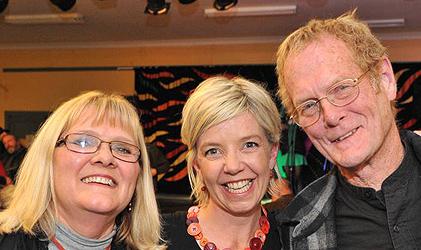
That's me on the right with Janette Carter (left) and Jo Stirling. Click on the photo to see a larger version. Shots of other Thirsties can be seen here (Patsy Radic on the right) and here (Nadia Intihar, right, with Sophie Leslie of Clever Sunday in the middle).
*
Yesterday, the eleventh anniversary of 9/11, saw a slew of articles about the
tragic events of that day and the aftermath. There's a nice collection on
Information Clearing House, which you can access
here.
*
Mon Sept 10:
Sorting through some papers this morning I came across a clipping
from The Sydney Morning Herald of June 21-22 2003. Under the
heading The Stories They Told, it quotes some of what
George Bush,
Dick Cheney, Colin Powell, John Howard and
other heroes of our time said around the time of the invasion of
Iraq. Here are some of the Howard quotes:
national television address, March 12 2003:
to Parliament, March 20 2003:
to reporters, April 10 2003:
to Parliament, May 14 2004:
No comment needed.
*
Wed Sept 5:
I went to the Scott/Thomson concert in
Picton the other day: it was as enjoyable and entertaining
as I had expected. There should be more such things!
*
Last Friday The Thirsty Night Singers sang at a
Kangaroo Valley event raising funds for projects in Timor-Leste.
Our new song, Bazza the Bass,
about fracking, went down a treat!
Next Saturday we're singing in Tomerong at a Sing for Uganda
concert which also features six-part female a cappella group
Clever Sunday, from Canberra, and local group Raised Voices.
After that, our future is uncertain: we hoped we'd be performing at the
Kangaroo
Valley Folk Festival, but there seems to be a spaniard, I
mean spanner, in their works so that might not happen. One of our
sopranos, Nadia Intihar, has announced that she will be
leaving the group at the end of the year, meaning that if we can
find a suitable replacement (not easy), we will have to spend a lot
of time getting her up to speed. This is an occupational hazard of
singing groups! We might do a concert in December, then take time
off for a while ...
*
Soprano Jane Sheldon is putting the finishing touches to a new
CD she has recorded. It contains a song of mine called Tommy
Tanna (A White Woman To Her Kanaka Swain), which I wrote
in the early 70s, setting an anonymous poem published in The
Bulletin in 1895. It was first recorded by Amanda Irving
and released on an LP that accompanied a book called The Glorious
Years, by Graeme Inson and Russel Ward. It
appears on a CD called Waltzing Matilda, released by
The Song Company,
sung by Anna Fraser (preview it
here),
and was recorded for the ABC by
Nicole Thomson (this is occasionally, meaning
all-too-infrequently, broadcast).
*
Paul Craig Roberts is one of my favourite critics of the USA.
In an article titled
The
Western Onslaught Against International Law (August 28 2012) he writes
Meanwhile, Bishop Desmond Tutu says
Tony
Blair Should Face Trial Over Iraq War (Sept 02 2012 in The
Observer):
By Toby Helm, political editor
Archbishop Desmond Tutu has called for Tony Blair and George Bush
to be hauled before the international criminal court in The Hague and delivered
a damning critique of the physical and moral devastation caused by the Iraq war.
Tutu, a Nobel peace prize winner and hero of the anti-apartheid movement, accuses
the former British and US leaders of lying about weapons of mass destruction
and says the invasion left the world more destabilised and divided
"than any other conflict in history" ...
[more]
George Monbiot agrees. In
We're
One Step Closer to Seeing Tony Blair at The Hague (The Guardian, Sept 04 2012)
he writes:
For years it seems impregnable, then suddenly the citadel collapses.
An ideology, a fact, a regime appears fixed, unshakeable, almost geological.
Then an inch of mortar falls, and the stonework begins to slide.
Something of this kind happened over the weekend.
When Desmond Tutu wrote that Tony Blair should be treading the path to The Hague,
he de-normalised what Blair has done. Tutu broke the protocol of power - the
implicit accord between those who flit from one grand meeting to another -
and named his crime. I expect that Blair will never recover from it ...
[more]
Of course, if Blair were ever hauled off to The Hague, I would
nominate John Howard and Alexander Downer (Lord Downer
of Baghdad) to accompany him. Speaking of Australian ex-Foreign
Ministers, I see that Gareth Evans - that great apologist
for Indonesia in its brutal subjugation of the people
of East Timor - is Chancellor of the Australian
National University in Canberra. He worked hand-in-glove with the
Vice-Chancellor, Ian Young, in cutting the Canberra School of
Music in half, thus doing untold (as yet) damage to that school's
programs of excellence, including Alice Giles's harp school,
and SHE (her Seven Harp Ensemble), and Tim
Kain's guitar school, and his guitar quartet Guitar Trek,
and David Pereira's cello school and his student cello ensemble.
I won't explore the pros and cons here except to say that there is
no God-given set-in-stone formula for university funding and that every
university makes its own decisions based on its own priorities. Forcing
the Canberra School of Music into an inappropriate funding model
meant that it simply could not survive. What do Evans and Young
know about the CSM's work? Have they ever attended a concert by one
of the school's outstanding ensembles or individual artists? What
appreciation do they have of the role of cultural activities, and
creativity, in university education? Very little, it would seem.
They slash and burn, in ignorance, only to be rewarded with
high awards under Australia's version of imperial honours. That's
the way it works. Winner take all. Feeling bad about throwing
great artistry on the economic rationalist scrap heap? Here, have
an AC - that will make you feel better.
*
Sat Aug 25:
The Fighters Who Fell started life as a poem in
Portuguese written by East Timorese resistance leader (later
President, then Prime Minister) Xanana Gusmão.
Agio Pereira, who later became Xanana's Chief-of-Staff,
translated the poem into English, assisted by my brother
Rob Wesley-Smith. They gave it to Peter Wesley-Smith,
who put the raw translation into verse. I then married this
to a Timorese melody called Kolele Mai and
arranged it for choir. Later, ten years or so ago, I arranged
it for The Thirsty Night Singers and for
Scott'n'Thomson. I first heard the latter arrangement
only a few weeks ago, when Rachel played it with soprano Jane
Sheldon.
I arranged Timorese folk-song Ina Lou at about
the same time. I composed the Intervention
a few years ago for, initially, Cathy McCorkill
(clarinet) and Julian Smiles (cello) of The Australia
Ensemble. I simply composed a clarinet melody over a cello
part consisting of the second Minuet from the Bach
Cello Suite #1 in G major, BWV 1007. Later, Peter
Wesley-Smith wrote words to the clarinet melody, to be sung by
Nicole. I wrote the kids' song I'm Walking in the City
many years ago for the kids' TV program Play School
(ABC TV). Lyric by Ann North (my ex-wife). It is
probably my most successful composition! I'm looking forward to
hearing it sung and played by Rachel and Nicole ...
*
Fri Aug 24:
The Pursuit of Julian Assange is an Assault on Freedom and a
Mockery of Journalism. So says
John Pilger in an
article
published yesterday by Information Clearing House. It's hard to
disagree with him. Excerpts:
Assange was not a political refugee, the
Guardian declared, because "neither Sweden nor the UK would in any
case deport someone who might face torture or the death penalty".
The irresponsibility of this statement matches the Guardian's
perfidious role in the whole Assange affair. The paper knows full
well that documents released by WikiLeaks indicate that Sweden has
consistently submitted to pressure from the United States in matters
of civil rights. In December 2001, the Swedish government abruptly
revoked the political refugee status of two Egyptians, Ahmed Agiza
and Mohammedel-Zari, who were handed to a CIA kidnap squad at
Stockholm airport and "rendered" to Egypt, where they were tortured ...
Accompanying this has been a vituperative personal campaign against
Assange ... His persecution is an
assault on us all and on freedom.
[more]
One mustn't forget that behind all this are allegations of
serious sex crimes. While in no way assuming that Assange is innocent
of wrong-doing here, the allegations have always
seemed to me to be spurious. Pilger writes:
Australia's role in the whole affair is shameful.
Foreign Affairs Minister, Bob Carr, said yesterday that
Assange had been contacted 62 times by Australian consular officials.
That could be 62 enquiries about his health, and whether he needs
a new toothbrush. Where's the vigorous protest, Mr Carr, at the
vindictive persecution of an Australian citizen who has not been
charged with a crime?
According to today's
Sydney
Morning Herald,
"Mr Carr ... called for Mr Assange to go to Sweden on the grounds
his extradition to the United States was unlikely and saying the
Swedish Government was 'not part of some fully blown CIA conspiracy'".
Would you go to Sweden if there was, say, a 5% chance of being nabbed,
taken to America, tortured, and thrown into jail for the rest of
your life? I certainly wouldn't. The disingenuous Mr Carr simply
would't know if Sweden is part of a CIA conspiracy or not. From
what Pilger says in the article mentioned above, it seems
highly likely.
Academy Award-winning film directors Michael Moore
and Oliver Stone raise another question that I've found
perplexing: how come the USA can prosecute a citizen of another
country for alleged crimes committed outside the USA?
[more]
*
Next Friday the Thirsty Night Singers will be singing
at an East Timor fund-raiser in Kangaroo Valley. The following
week we will be doing a fund-raiser in Tomerong, with
other a cappella groups Raised Voices and
Clever Sunday. The gig after that will be at the
Kangaroo Valley Folk Festival in October. Friday's
gig will feature the first outing of our version of Bridge
Over Troubled Water and the very first performance of our
new song about coal seam gas mining, Bazza the Bass.
*
Sat Aug 18:
Watching three powerful nations - Great Britain, Sweden and the
United States of America - hounding Julian Assange has been
unedifying, to say the least. Assange has not been charged with a
crime, yet the Australian Prime Minister has pronounced
him "guilty". Her government mutters vague words about offering him
consular assistance but refuses to stand
up for him in the face of death threats made against him by
various prominent American pundits and politicians. The British
government says it must obey the law, and thus is assiduous in
trying to meet its extradition responsibilities to Sweden. It showed
no such respect, however,
when it wanted to invade Iraq. As far as
I can see, if Assange is guilty of publishing classified material then
so too are the editors of The Guardian, The New York
Times and other newspapers. I can make no comment about the
sex crimes he is alleged to have committed in Sweden other than
to say that the process there looks decidedly dodgy. In other
words, we're watching what seems to be an extraordinary farce where
the only credible participants are the Ecuadorean government
and Assange himself. My bet is that
the CIA will find a way to bump him off and thus remove this
living embarrassment to American imperialism.
"AUSTRALIAN diplomats have no doubt the United States is intent
on pursuing Julian Assange, Foreign Affairs and Trade Department
documents obtained by the Herald show." So says an article -
US intends to chase Assange, cables show - by
Philip Dorling in yesterday's Sydney
Morning Herald. Read it
here.
It finishes with "Senator Carr's office yesterday continued to insist
Ecuador's asylum decision and Assange's circumstances remained a matter
for Britain, Ecuador and Sweden." Senator Carr is Australia's Foreign
Affairs Minister Bob Carr. As an Australian I want my government
to stand up and be counted when it comes to what amounts to harassment,
official or otherwise, of Australian citizens. Carr's refusal to get
involved puts him in the same camp as one of his predecessors,
Alexander Downer, who with ex-Prime Minister John
Howard refused to watch out for Australian citizens Hicks
and Habib.
See this article:
British
Threat Against Ecuadorean Embassy Was a Diplomatic Blunder. It
wasn't so much a diplomatic blunder as an arrogant threat by a country
that has apparently forgotten that its days as an imperial power are
over.
*
Coming up: the Tenth Annual Kangaroo Valley
Buster Keaton Silent Movie Show, with pianist Robert Constable.
This hilarious event will be the last show in the series (at least the last one
organised by me). It will be held on Sat Sept 29 2012 in
Kangaroo Valley Hall, and will raise funds for educational projects
in Timor-Leste managed by the Kangaroo
Valley-Remexio Partnership. In order to see an ad prepared for the local paper,
direct a well-aimed click
here.
*
Monday Aug 13:
We did it: The Thirsty Night Singers entered two
categories in the Choral section of the 2012
Shoalhaven
Eisteddfod - ENSEMBLE - OPEN (3 to 12 voices) and
CHOIRS - OPEN. We won them both!
Here's me after having received the certificates and cheques,
with adjudicator Lyn Aldred (left) and
Marie De La Torre of the Bomaderry CWA Combined Choir
(right):
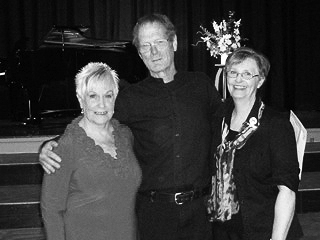
photograph by Anna Pedersen
*
I recently wrote the program note for my piece Morning Star
Lament, for cello and piano, prior to it being released on
a Tall Poppies CD:
My piece Morning Star Lament treats the melody of
Kijne's song as something beautiful and sad - more a lament than an
anthem. A lament for those who have died resisting the occupation,
for those who are prisoners in their own country, for the destruction
of their environment, for the brutality of the occupiers, for the
hypocrisy of the West ...
*
Meanwhile, The Jakarta Globe reports
Police
Arrest 10 in Papua for Raising Morning Star Flag:
Authorities say they were cracking down on subversion against the state,
while Amnesty International called on Friday for an investigation into human
rights violations perpetrated by the Police Mobile Brigade (Brimob) ...
[more]
*
Another piece of mine - Songs and Marches, for guitar quartet
- has just been released on
Tall Poppies CD
Six Fish (TP221) by
Canberra group Guitar Trek. The title of the CD comes from a
marvellous piece by Nigel Westlake. Other pieces on the CD
- all excellent - are
by Australian guitar legends Phillip Houghton and
Richard Charlton. I'm thrilled with the performance of
my piece! My thanks to Tim Kain, Minh Le Hoang,
Daniel McKay and Harold Gretton for putting so much
skill and musicality into it.
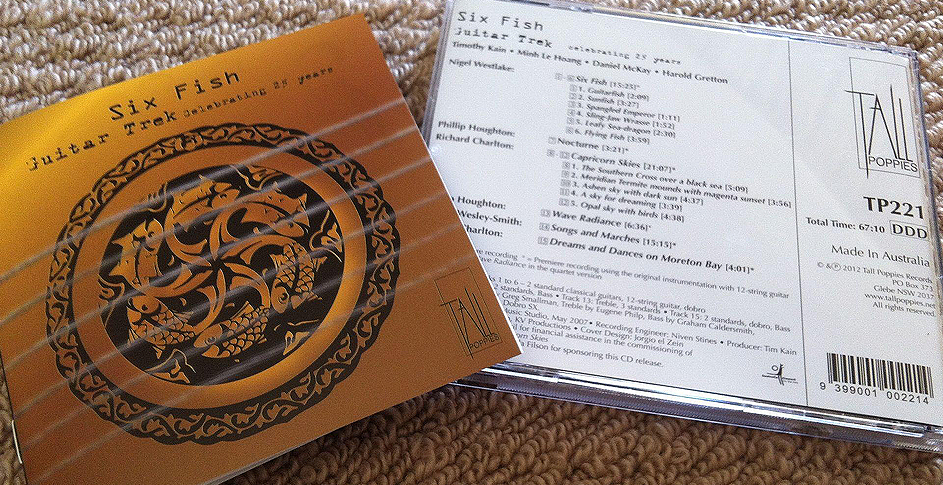
A comment from an astute friend of mine:
That must be the best review I've ever received! What a pity it wasn't published in a leading journal ...
*
Monday July 30:
I'm a great fan of journalist/author Robert Fisk. In yesterday's
The Independent, in an article called
Syrian
war of lies and hypocrisy (sub-titled
The West's real target here is not Assad's brutal regime but his ally,
Iran, and its nuclear weapons), he writes:
[more]
*
I've come across a review of my chamber music CD Merry-Go-Round,
in the ABC's Limelight magazine,
that I'd forgotten about. In the interests of shameless self-promotion,
I reproduce it here:
Whatever motivations a composer may have for creating their music, they are more
often than not specified on a superficial level, if at all.
Here though, we have a CD in which the composer's motivations are so intrinsic to
understanding his work that you almost find yourself listening intently to each note
for what it may tell you about the South Australian Wesley-Smith. More fundamentally,
about what he cares about.
Firstly, humanitarianism: Wesley-Smith is music's defender of the rights of the East
Timorese people. But what seems like a political statement can just as easily morph
into a jazz pastiche. Secondly, a playful response to childhood classics: he worked
for years writing music for children's television and radio. These are works composed
by a man who finds, wherever he looks in the world, the inspiration to create a
sparkling micro-environment of sound.
The performance, largely wind-based, has just the lightness of touch it needs without
fudging the depth of feeling embedded in the music. If the track titles themselves sound
rather lightweight - Snark-Hunting, Merry-Go-Round,
Oom Pah Pah - we can sense this is
simply Wesley-Smith's way. He applies a quality of understatement that is lacking in the
subjects he tackles. His music is tuneful and harmonic, mordant and inquisitive, suddenly
pausing for moments of reflection without resorting to melodic sentimentality. Wesley-Smith
does right by his subjects.
An imaginative CD of great warmth and depth.
[more]
The wise Mr Page is clearly a man of great taste and erudition.
*
Last Friday there were three funerals - none of which I was able
to attend - of people I knew. Sylvia Godson-King was a
beautiful and charming long-time resident of Kangaroo Valley who
succumbed to cancer, as did Helmut Schaeffer, a strong
supporter of East Timor who taught at Oxley College in the
Southern Highlands. Blind musician/composer/teacher Ian
Cooper, who taught at Frensham School, was taken out by,
I'm told, emphysema (which also claimed, six years ago, my
brother Jerry). My condolences to the friends and family
of these three lovely people.
*
This coming Sunday, The Thirsty Night Singers will be
competing in the 2012
Shoalhaven
Eisteddfod!
*
Sunday July 22:
Brilliant Australian pianist Piers Lane is the Director of the
Australian Festival of Chamber Music in Townsville. In the
current issue of
Limelight
Magazine he writes:
[more]
I must say that the audience response that morning was among the best
responses any performance of a piece of mine has ever received. I had
dozens of people coming up afterwards, and at other concerts during the rest of
the festival, saying not only how much they enjoyed it but how there should
be more of that kind of thing. It's an audio-visual piece, with some powerful
graphics, about propaganda, official lies etc, especially those that led to
the invasion of Iraq, and sends up various world leaders including Bush
(the younger), Blair, Howard and Saddam. Inspired by an
article by Australian human rights campaigner Julian Burnside,
it is hardly controversial - yet despite its success, clarinettists,
and pianists (there's a version for piano), show zero interest in it. I think
this has something to do with the old politics-and-music thing and the innate
conservatism of most classical musicians. An exception is Australian clarinettist
Ros Dunlop, who has played the piece in various parts of the world,
sometimes with me handling the projections (see
here).
*
Saturday July 21:
Yesterday I drove to Sydney to hear cellist
Rachel Scott
play (and sing) my piece Uluru Song, a piece she
has performed hundreds of times in many countries of the world.
Before that I discovered our dog Ghoti (pronounced
Fish) displaying symptoms of tick poisoning, even though I
couldn't find a tick on her anywhere. A quick trip to a vet
resulted in her staying in hospital overnight - but she's now
OK and expected to make a complete recovery.
[more]
*
Australian Prime Minister Julia Gillard, apparently on her last
legs as PM, remains opposed to same-sex marriage. In an interview published
here,
she says:
Ms Gillard knows that the leader of the Liberal-National Perty coalition,
Tony Abbott, has refused to allow his parliamentarians a conscience
vote - the party position is opposed to same-sex marriage - so there is no
hope, in this parliament, for any change. There are times when one shakes
one's head in disbelief at the stupidity of Ms Gillard - who still thinks
that Julian Assange is guilty even though he hasn't been charged
with any crime. She remains an ardent supporter of the Western invasion of
Afghanistan. At a time when she is being increasingly denounced as a liar
(an accusation that I have defended her against), she pulled out of an
agreement with independent MP Andrew Wilkie re poker machines once
she'd gained, in effect, an extra vote in parliament by the appointment
of Peter Slipper as Speaker, saying that she would not have been able to
get the proposed bill through parliament. I would not - could not -
vote for her even if her opponent is the afore-mentioned Abbott, one of the
most odious MPs of recent times.
Ms Gillard is an un-married atheist living "in sin", and in The Lodge,
with her partner. It is extraordinary that the Australian people have
accepted this with hardly any fuss, a measure of how community attitudes
have changed in recent years. Gillard is quite happy to take advantage
of this in her personal situation but to deny others a situation with which
the majority of Australians have no problem. What's more, she can't come
up with a cogent reason to support her view (all she can say, apparently,
is "I've got a view about the cultural status of marriage in our society").
At a time when she needs every vote she can get, it is extraordinary to
me that she is prepared to risk alienating a large section of society.
*
Tuesday July 10:
That great champion of the East Timorese people, Sister
Susan Connelly, has written an excellent article called
History curriculum perpetuates East Timor myths,
published yesterday in Eureka Street.com.au. She writes:
[more]
Australia's relationship to Timor-Leste has been one of
exploitation. In 1941 we invaded neutral Portuguese Timor,
causing the deaths of up to 60,000 Timorese killed by
Japanese troops for assisting the Aussies. In 1999, Howard
and Downer, presented with clear evidence of Indonesia's
intentions if the UN referendum didn't go their way,
dismissed anything untoward as the work of "rogue elements".
Australia has much to be ashamed of with regard to the
"Isle of Fear".
*
Sunday July 8:
In an article titled Taxing the truth: why we must not let Abbott's
dogmas lie, The Age, July 7 2012, Ian
Robinson writes:
A lie is when you say something is true when you know it is not true.
This is quite different from a commitment, which is a promise to do
something in the future.
We can be absolutely certain that Abbott, as a former student in a
Catholic seminary, knows the substantive and moral difference between
a lie and a commitment.
So when Abbott says the Prime Minister told a lie, he is saying
something is true when he knows it is not true, so Abbott is telling a lie.
[more]
Impeccable logic. Furthermore, as the article states, implicit in
Prime Minister Gillard's commitment was her leading a majority
government after the election, which she wasn't able to achieve.
The hypocrisy of the
Liberal-National Party Coalition on this is plain to see, even
though a substantial portion of the electorate, perhaps even a
majority, refuses to see it. I should say, however, that Gillard's
step back from poker machine reform showed that her promise to
Independent Andrew Wilkie was a lie. We don't
hear about this from Abbott because he perceives poker machine
reform to be not in his best political interests. As always,
it's not about what's right but about what is likely to bring
victory in the next election.
I would never vote for the Coalition under Abbott. Perhaps
I could under Turnbull, but it would be taking such a
risk that my hand would seize up in the voting booth. The Labor
Party doesn't deserve my vote, with its response to so many issues
causing me to shake my head in disbelief. To name a few: internet
censorship; its refusal to stand up strongly for Assange; its
funding of Christian chaplins in state schools; and its apparent
inability to reform itself, including ridding itself of union
leader Paul Howes, who was one of the architects of the
Gillard-for-Rudd swap, which even he admits was a mistake.
His current calling for the repudiation of electoral agreements
with the Greens would, were it implemented, contribute to Labor's
annihilation at the next election.
*
Saturday July 7:
So writes Justin Raimondo - editorial director
of Antiwar.com -
in an article called
Assange's
Last Stand?, July 6 2012. It is an excellent
appraisal of the dilemma in which Julian Assange finds
himself.
American author William Blum writes:
[more]
His article - Julian
Assange, Infinite Justice,
Barack Obama, his Mother, and the CIA - was
published in Information Clearing House on
July 3 2012. Read it
here.
Another hero of straightforward tell-it-how-it-is punditry is
Patrick Cockburn, whose article How Julian Assange's
private life helped conceal the real triumph of WikiLeaks
was published in The Independent (UK) newspaper on July 1:
An extraordinary aspect of the campaign against Assange is
that op-ed writers feel free to pump out thousands of words
about his alleged faults, with never a mention of far more
serious state crimes revealed by WikiLeaks ...
[more]
"Who would willingly take even a 5 per cent chance that their
flight to Stockholm might result in 40 years' detention in a
US prison cell?"
*
Sunday July 01:
Last night the Thirsty Night Singers performed
at the launch of a book called The Art & Soul of
Kangaroo Valley. We went over pretty well, all in all.
Actually, we wowed 'em ...
Last Wednesday I attended a concert in Robertson (not far
from Kangaroo Valley) by soprano Jane Sheldon,
cellist Rachel Scott and harpist Genevieve Lang.
They performed Bach, Handel, and so on, and ...
Wesley-Smith, an arrangement I did years ago of a song
called The Fighters Who Fell for soprano and
singing cellist. That song started life as a poem written
in Portuguese by Timorese resistance leader Xanana Gusmão
(subsequently President then Prime Minister);
it was translated by Agio Pereira with the assistance of
Rob Wesley-Smith and sent to lyricist Peter
Wesley-Smith, who took the raw translation and put it into
verse form. I then set it to the music of a traditional East
Timorese song, Kolele Mai, and arranged it for choir.
A few years ago Rachel, who regularly teaches in Timor-Leste,
as it is now called, asked me to arrange "something Timorese
for soprano and cello". I chose The Fighters Who Fell,
requiring Rachel to sing too. I had never heard it before last
Wednesday: was delighted by it! The two voices, combined with
double stops on the cello, were dark and delicious, making
it one of my more successful arrangements. I hope to get it
recorded before the end of the year.
Jane played me a recording she made recently of my song
Tommy Tanna, which is due to be released on CD
later this year. Beautiful! Another piece being released soon:
Songs & Marches, for guitar quartet, played
by Guitar Trek. My piano (four hands) piece Brother
Jack has been scheduled for recording 'ere long.
Each year Rachel puts on a series of concerts called Bach in
the Dark. She writes:
I believe the concert is on July 20 - but tickets are reserved for an invited
audience. If extra tickets become available, I'll post the details here.
*
Today is the day Australia's so-called carbon tax started. So far the
sky hasn't fallen in (predicted by Opposition Leader Abbott), but it
might happen tomorrow. Or the next day. I support putting a price on carbon
as it will encourage the use of cleaner energy. It's not a perfect scheme,
and it's too little too late, but at least it's something. I salute
Australia's Labor Government for having the courage to introduce it
despite continuing strident opposition ...
Another big issue in the Australian parliament of late has been what to do
with asylum seekers who arrive by boat. I was interested to read this
contribution to the debate by a reader named Ricardo in response
to something written by True Blue Aussie, June 27 2012:
To read the original article - A modest proposal to deter
asylum seekers, by Jonathan Green - click
here.
*
Sunday June 24:
Tensions are at breaking point in the easternmost province of Indonesia
after the police shooting of independence activist Mako Tabuni.
Human rights activists report Tabuni was unarmed when shot six times
by the Australian-trained Detachment 88 forces. Tabuni was deputy
chairman of the West Papua National Committee, an organisation advocating
independence and the right to self-determination under international law.
Tabuni had also been campaigning for an investigation into a recent spate
of military killings.
The shooting follows years of violence. At least 16 people have been killed
in the past month, according to human rights groups, and hundreds of homes
raided, with many burnt to the ground. Thousands are reported to be evacuating,
seeking refuge in the forest or heading for refugee camps in Papua New Guinea.
Credible reports of human rights violations by Indonesian security forces have
emerged, including torture, excessive use of force and extrajudicial killings.
Yet Indonesia's State Intelligence Agency chief, Lieutenant-General Marciano
Norman, placed blame on the Free Papua Movement, "foreign agents" and local
residents for the violence. The President, Susilo Bambang Yudhoyono, played
down the events. As Indonesia obfuscates and Australia remains silent, West
Papua bleeds. While most Australians are proud of our role in ending 24 years
of bloody Indonesian occupation in East Timor, we should not forget it came
after a long history of accepting Indonesian assertions of sovereignty while
ignoring human rights abuse on our doorstep ...
[more]
See, also, The hope for peace in Papua recedes -- for now, by
Endy Bayuni, published in
Foreign Policy,
Friday June 22. Excerpt:
[more]
Unfortunately, Australia's Minister for Foreign Affairs, Senator Bob Carr,
seems to want to win the prize for the most servile Australian politician in dealings
with Indonesia. He has some distinguished competition, of course, including ex-PM
Paul Keating and ex-Foreign Minister Lord Downer of Baghdad, but he's
off to a flying start. In his answer to Questions Without Notice in the
Australian Senate, March 20 2012, Carr said:
Later:
Two responses: firstly, the fact that
"all the governments of the world recognise Indonesian
sovereignty" does not mean that Australia should. Most other countries
defer to Australia's position, it being the Western country closest to and most
involved with Indonesia. If Australia were to take the lead in
raising questions about Indonesia's role in West Papua, many countries
would follow. The notion that no-one should do anything because
no-one else is doing anything makes a mockery of our supposed
independence.
Secondly, Australia has no qualms about associating itself with
small militant groups threatening Libya, say, or Syria. We don't
interfere with Indonesia's continuing rape of West Papua because we're
frightened that Indonesia might threaten us. It is
"not in Australia's interests" to stand up to the
regional bully, so we sell out the indigenous
West Papuans in the same way we sold out the East Timorese.
Carr's verbiage is full of such stuff as
"full and frank exchanges ... with our Indonesian
counterparts". But these exchanges
never seem to lead to any changes. He says
"President Yudhoyono - a great friend of Australia's, by the way -
has committed his government to raising the living standards of
the people of Papua and reinvigorating special autonomy." Why is
it that the the people of Papua have seen no
difference in their living standards since the bogus Act of Free
Choice in 1969? If Indonesia is committed to
"shifting responsibility for law and order in the Papuan provinces
from the military to the police", why does it keep sending troops
there? What it doesn't seem to realise is that the daily violence
inlicted on indigenous West Papuans is guaranteed to stiffen the
West Papuan resolve to seek independence. Indonesia and the
international community
should try to learn from the
disaster that was East Timor, or face a calamity even worse.
*
A long list of prominent American activists have signed a letter,
dated yesterday,
to President Correa of Ecuador, urging him
to grant political asylum to Julian Assange. The list includes
Michael Moore, Oliver Stone, Naomi Wolf,
Glenn Greenwald, Chris Hedges, Coleen Rowley
and Ray McGovern.
*
Monday June 18:
Despite all the disappointments of the current Labor government
in Australia, I've always had a belief that underneath its
aura of incompetence lies basic decency and intelligence. Now,
however, with its refusal to stand up strongly for the rights
of Australian citizen Julian Assange,
this gutless USA-kowtowing government has showed itself to be
just as vacuous and morally deprived as the Howard
government before it. Remember Howard's lack of support
for Hicks amd Habib? PM Gillard, once a
barrister, pronounced Assange guilty when first asked about him,
even though he hadn't - still hasn't - been charged with any crime.
Compare this to her ridiculous support for an Australian
teenager accused of drug offences in Bali, or to Foreign Minister
Bob Carr's heroic, if self-glorifying, efforts on behalf
of International Criminal Court lawyer Melinda Taylor,
languishing in a Libyan jail. When Assange is languishing,
quite possibly being tortured, in an American jail, facing
the death penalty, will Gillard and Carr jump up and down about
the rights of an Australian citizen? No way. Attorney-General
Nicola Rixon will mouth a few platitudes about how
"the Government considers the safety of Australian citizens
to be of paramount importance" and that it "continues to
provide consular support to Mr Assange" (from a recent letter to
Australian civil rights lawyer Jennifer Robinson; to
read the whole letter, click
here
(pdf)), but she will no doubt stand by as the Americans check the
chosen electric chair to make sure it's working.
Has there been an answer to the disgraceful situation recently
when Ms Robinson was stopped, she claims, at Heathrow airport,
only days after meeting Assange, and told she was on an inhibited travel list
and unable to enter Australia without permission
from the Department of Foreign Affairs? (see
here,
Sydney Morning Herald, April 19 2012)
From Julian
Assange Seeks Asylum at Ecuadorean Embassy:
Beiruti writes, on the above website:
Assange's mother, Christine Assange:
(see
here,
published yesterday)
See, also,
Assange's
mother slams Bob Carr.
From Roxon
letter spurs Assange flight to Ecuador embassy (Sydney
Morning Herald, today):
Seems to me that if the Americans can't get Assange legitimately then
a stray drone over Ecuador will have to do the job.
Guy Rundle has an excellent analysis of the situation in yesterday's
Crikey. Read it
here.
In a comment on that article, ZUT ALORS writes:
"It was bad enough when J W Howard gift-wrapped Hicks for the US govt
but we expect Gillard and Roxon to behave with more intelligence and compassion."
Not any more. Puddleduck: "Poor bastard. Assange will last as long as a snowflake in hell
if he is ever in the clutches of the US. They will eat him alive.
Frankly, I'm surprised he hasn't run sooner and I don't blame him
for doing it."
*
Monday June 04:
The Song Company
will be performing a song of mine - Who Stopped the Rain? -
at the Bellingen Music Festival, this Saturday June 9 at 7.30pm. For details
of the festival program, click
here.
Apart from Who Stopped the Rain?, which I wrote when I was 20 and
subsequently arranged for six voices a cappella, this marvellous group will sing
Dawn Mantras by Ross Edwards,
Out there by Dan Walker,
after Irkanda by Peter Sculthorpe,
Past Life Melodies by Sarah Hopkins and
Where the cats sleep by Elena Kats-Chernin
as well as traditional gospel and Australian folk songs. Wish I
could be there!
*
I used to sing in a choir in Berry called The Courthouse Choir.
One of the pieces we did,
and loved, was Rachmaninov's Bogoroditse Devo. Click
here
for a superb YouTube rendition of the piece by six members of
The Australian Voices
(Artistic Director: Gordon Hamilton).
*
Thursday May 24:
Australian politics are currently infused, more than ever, with
vicious personal attacks, mainly to do with the
Craig Thomson
and Peter Slipper affairs.
The fundamental principle of "innocent till proved guilty" has been trashed by the
Federal Opposition and the mainstream media, and it is horrifying to see people tearing
into both men, even though no accusation of wrong-doing has been proved. If Thomson
has his day in court, and is found not guilty, he would potentially win millions of
dollars in defamation cases. Slipper, too. I find the James Ashby allegations
of sexual impropriety against Slipper highly suspicious (see
I Think
I Smell A Rat, posted on the Wixxyleaks website on May 16).
The Opposition is playing politics, of course. Nothing wrong with that. But
what we are currently witnessing is going far beyond vigorous debate ...
*
Where I live (Kangaroo Valley) one comes across the occasional leech.
There's an interesting story
- Leeches
Are DNA Bloodhounds in the Jungle - about these fascinating little creatures
on the website ScienceDaily:
[more]
It seems that leeches have a use after all (apart from assisting
patients who have had microsurgery). I've never understood
what role they play in the ecological system. Nothing eats them, as far as I
know. They suck blood (around here they seem to favour echidnas, horses,
wombats and humans); when full they drop off and immediately go off looking
for another blood-engorged leech - peferably a good-looking one - with which to
mate (they are hermaphroditic). They can survive for a year or so without a feed,
living under rocks in, ideally, cool damp conditions. When feeling peckish
they come up, attach themselves to a passing mammal, injecting a
blood-thinner and an anaesthetic as they feed. Read about them in Australian Geographic
here.
*
See this article -
No Country
for Young Men as Old Men Play for Time: The End in Afghanistan is
Totally Predictable by Dave Llindorff in Information Clearing
House, May 23 2012:
That was 1971, and the Vietnam War continued to drag on for two more years, with more
Americans dying, and with many more Vietnamese being killed, until finally the last
US combat troops were gone. But even then the fighting continued, with the Army of
South Vietnam armed and financed by the United States, until April 30, 1975, when
the last resistance ended and Vietnam was liberated and reunified and finally at peace.
During those two terrible years between Kerry's statement and the end of US combat
operations, American soldiers stationed in Vietnam knew that the war was lost, and
knew they were there for no reason other than keeping President Nixon from looking
like he had lost a war, particularly as he faced re-election during the campaign
year of 1972 ...
Now consider the situation in Afghanistan. Once again a war has been lost by the US,
this time to forces far weaker and more poorly organized than the Viet Cong and the
North Vietnamese army. Once again American troops are being asked to keep fighting
for a mistake -- this time the 2001 fantasy of the Bush/Cheney administration
that it could make a client state out of Afghanistan, a mistake that President
Obama doubled down on after taking over the White House, when he called Afghanistan
the "good war" and committed another 30,000 troops there, plus ordering up an
aggressive kill campaign of night raids, assassinations and the heavy use of
pilotless armed drone aircraft ...
[more]
I have never understood how the Americans and their allies thought they
could control Afghanistan, that "graveyard of empires". Obama could have
withdrawn American troops as soon as was elected (and thus justified his
Nobel Peace Prize), ensuring that the Afghanistan debacle remain Bush's
debacle. But he's hanging on, and on. Llindorff predicts that:
The "government" of Afghanistan, meanwhile, knowing its days are numbered,
will be preparing its exit, with money spirited out of the country, while
the police and army, knowing that they will ultimately pay a deadly price
for serving the US master, and too poor to buy their way out of the country,
will increasingly turn on American forces, or simply switch to what they know
will be the ultimate winning side. This is all totally predictable.
Australian Prime Minister Rudd could have taken us out of
Afghanistan when he took over from
War
Criminal Howard.
Gillard, too, could have taken a bold stand. Instead she maintained
the status quo, allowing yet more Australian soldiers to lose their lives
- for a mistake.
*
Monday May 21:
I've been busy of late doing various things including doing sound
for a concert in Kangaroo Valley by Joseph Tawadros (oud),
James Tawadros (req), and Steve Hunter (electric bass)
- brilliant concert, amazing virtuosity. We have a new soprano in the
Thirsty Night Singers, so much of our rehearsal time at the
moment is taken up going over songs the rest of us know pretty well.
New repertoire includes Brian Wilson and Mike Love's
classic God Only Knows (the arrangement by
Tomas Bergquist for The Real Group) as well as Peter's and my
Freddie the Fish and We Thought We'd Lost You,
Johnny. We have several gigs coming up. I'm currently
setting up a new work space. Last weekend I sang, with three others,
a specially-written-and-arranged birthday song for a friend of mine ...
Various deaths have occurred since I last blogged,
including that of Melbourne composer
Felix
Werder (read a brilliant article about him, written by
Warren Burt not long before Felix's death,
here).
Australian activist David Scott died recently. He wrote a most
interesting book about East Timor's travails called
Last
Flight Out of Dili: Memoirs of an Accidental Activist in the Triumph of East
Timor, and he played a vital part in the struggle for Timor's freedom.
The March 2010 issue of Quadrant contains an article by John Izzard
called Crumbs
of Compassion, about events around the 1975 Indonesian invasion
of East Timor. It includes an account of the 1976 voyage of The Dawn,
a boat that tried to get humanitarian supplies to the beleagured East Timorese
(one of the four brave men on the boat was Darwin activist Rob Wesley-Smith). Read it
here ...
The odious John Howard took the opportunity to pat himself on the back
for his government's role in the liberation of East Timor in 1999. The truth is
that he suggested autonomy for the East Timorese, not a referendum, putting off
any serious action for ten years. He knew that the TNI-controlled militia
were committing massacres of innocent Timorese citizens and planning more,
but he waited till the last possible moment before sending troops in. In the
meantime, thousands died. Note that not a single Indonesian citizen has been
convicted of any crime to do with the killings in Timor ...
I have a continuing health issue; a visit to a specialist in Wollongong last
week indicated that there has been no change in my condition, meaning that the drug I'm taking -
Tarceva - is stopping things getting worse. There are a few side FX, but nothing up with
which I cannot put. I'm lucky: several friends of mine with a similar illness are in
much worse shape than me ... The April
West Papua Report, issued
by ETAN in the US, contains the usual accounts of
outrages committed with impunity by Indonesian security forces:
Five victims of this
travesty of justice - Forkorus Yaboisembut, Edison Waromi, Selfius Bobii,
Agus Kraar and Dominikus Sorabut - were each jailed for three years for
nothing more than peaceful protest. As usual, Australia, the US, Britain etc kept their
heads in the sand. Last Sunday was the 10th anniversary of Timor-Leste obtaining its
independence. Many words have been written about this event. One of the most thoughtful
articles I've read is by Michael Mullins:
East Timor's independence
is from Australia, published in
www.eurekastreet.com.au/:
*
Tuesday May 01 - May Day:
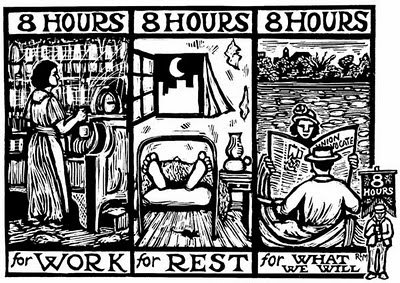
From an internet site whose URL I can no longer find (sorry!):
*
music & politics:
Wednesday April 11 2012
Dear Anthony Kiedis, Flea, Chad Smith, and Josh Klinghoffer,
In 2005, Palestinian Civil Society called for a cultural boycott of
Israel. Red Hot Chili Peppers, as artists of conscience, please
don't ignore the nonviolent approach of Palestinian people by breaching
the boycott. Your solidarity with the cultural boycott is needed.
The boycott call by Palestine has become a global movement, and with
good reason ...
*
Last Wednesday's ANZAC Day prompted memories of the impact war had on
my family, including the death in an aircraft accident in 1942 of my uncle
Robbie (my father's brother). I've come across the official telegram:
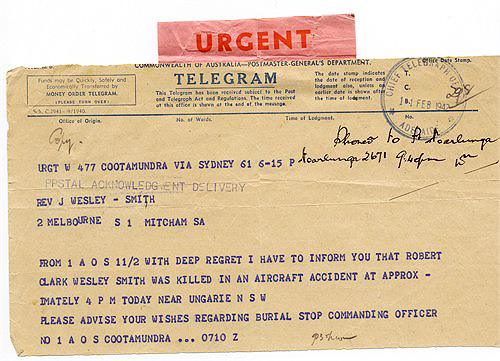
Robbie died in a training accident prior to combat duties in the Second World War.
*
Sunday April 29:
music & politics:
I see that Bob Dylan, who wrote and performed Masters
of War and other classic anti-war songs, "is accepting
a Presidential Freedom Award from a
cynical if affable, still, to many people, master of war. What is
Dylan thinking?" (from
Make
Love, then War by Linh Dinh, Information Clearing House,
April 27 2012). Read more
here.
MiKi67 responded:
Let's hope Dylan turns it down. If he doesn't then he will be revealed
as a hypocrite.
*
Wednesday April 25:
Today is ANZAC Day in Australia, the anniversary of my father Harry's death
(in 1986) and the day before my mother Sheila's birthday. I acknowledge the
extraordinary sacrifices made by Australia's service men and women -
including my father - in various wars, but I feel that the day has been
cynically manipulated by politicians, particularly J. Howard, to become
a celebration of militarism. I guess I'm more a And the Band Played
'Waltzing Matilda' than a National Anthem sort of bloke.
I like this comment, which I saw this morning:
I also saw this:
In some cases, Australia's wars have contributed to our "relative freedom
and security". In others - e.g. Vietnam, Afghanistan, Iraq - they haven't.
In fact our invasions of Afghanistan and Iraq have threatened our
freedom and security.
My problem with ANZAC Day is not the glorification of the soldiers and
others who put their lives on the line, but the glorification of
war itself.
*
I have a covered garden, designed to keep bower birds, wombats, wallabies
etc from whatever I manage to coax to grow there. Unfortunately it
doesn't keep out rats, who have prospered on my sweet corn, apples,
zucchini etc. A few days ago I discovered a large python in there, which
I warily welcomed. A Korean member of WWOOF (Willing Workers
On Organic Farms) was too frightened, however, to
do his designated weeding, claiming that the snake had been chasing him
(next morning he left, several days before the due date). Today I found
the python trying to leave via the chicken wire fence. About half-way
through, it got stuck, a bulge in its belly suggesting that it had
consumed one of my rats. A pair of tin snips, cautiously applied, snipped
the wire, allowing the snake to live another day.
*
Tuesday April 24:
Came across this photo on facebook today. It's of some of my favourite percussionist friends with, third from left, American composer Steve Reich, currently in Sydney. From left, Rebecca Lagos, Bree Van Reyk, Alison Pratt & Timothy Constable. The bloke on the far right is Joshua Hill, whom I don't know. The musicians are rehearsing for a concert at the Sydney Opera House on Sunday on which they will play Reich's Music for Eighteen Musicians. Reich was a huge influence on me as a student composer, his electronic piece Come Out changing the way I looked at - and listened to - music. Alison, Becky and Tim have all played my For Marimba & Tape. As far as I know, Bree and Joshua haven't. What's going on, guys? C'mon!
*
Sunday April 22:
If you're a Bible-thumping Christian, ignorant of the notion of separation of church
and state, you will enjoy an article published in today's Sunday Telegraph,
Sydney. Written by Barclay Crawford, it is titled
the
Bible can teach our children the essential lessons of life. What really
grabbed my attention was the conclusion:
And there's more danger in all of those than anything contained in either
Testament of the Bible.
[more]
Crikey! I'd better watch my step. I no longer do
macrobiotics or transcendental meditation, but I'm not averse to voting for the Greens,
despite having attended Religious Instruction classes
(Christianity Instruction classes, actually)
throughout my school career.
Speaking of the Greens, I pay tribute to Bob Brown, leader of the
Australian Greens, who recently announced that he will be resigning from the
leadership, and from the Senate, while he is still young enough to pursue
other interests (such as bushwalking). Read an excellent article about him -
Bob
Brown hikes off into his political sunset by
James Norman (The Age, April 15 2012) -
here.
*
I've just read an article by Adam Brereton in
April 17's New Matilda.com
called
A Decade
of Failed War. Here's an excerpt:
"I mean, I want to see democracy everywhere, but I'm not starry-eyed enough
to think you're going to have it flourish in Afghanistan in ten years time.
We were never into that - we were always into retaliating [for the September 11
attacks] and denying the capacity for al Qaeda to come again, and we were
successful in that. Very successful."
So much for the assurance in his original moral justification for the war,
outlined in an address to the Australia Defence Association in October 2001:
"The cause with which we are allied is just. It is no simple act of revenge.
It is no knee-jerk response to combat terror with terror in return."
The problem that all liars face is remembering which lies they've told when ...
See the entry for April 12, below.
*
Surely the last word on the occupation of Afghanistan must come from
former Afghan MP and democracy activist Malalai Joya, who says
"In the Taliban time, we had one enemy. But after 10 years of war,
we have three - the warlords, Taliban and occupation forces." See
here
(an excellent article - Leave Afghanistan, Urges Joya -
by Pip Hinman in
New Matilda.com).
Meanwhile, Julian Assange's mother Christine Assange
has demanded the resignation of Australian Attorney General Nicola Roxon.
Read all about it here
(WL Central).
Read the Crikey report
here.
Note that Ms Robinson is also a staunch advocate for the people of West Papua.
This alone makes her a dangerous person subject to bullying from governments
anxious to appease Indonesia. She'd better watch out.
*
Last Tuesday night I sang a couple of songs at a 60th birthday party
in Kangaroo Valley for Tall
Poppies Records head honcho Belinda Webster. They were both
specially-written. Words by Peter Wesley-Smith, music by me
(actually, one of them, written ten years ago for her 50th birthday,
used the tune of Galway Bay, which I wish was mine).
Here's the first verse and chorus of the recent one:
It got worse from there, descending into slander and smut. The music, however, was as clean as a whistle! Click on the photo of Belinda above to see a larger version. Graphic by Diana Jaffray.
*
At last an establishment figure has decried the stationing of American
troops on Australian soil. In an article called
China
will 'take us as a prize': Fraser (The Australian, April 12 2012),
Bernard Lane writes:
He argues that Australia's decisions to welcome US troops to the Northern
Territory and to entertain the idea of US surveillance drones in the Cocos
Islands were part of a bigger picture of Australia as a subservient partner
in an attempt to contain China by military means.
Yesterday he told The Weekend Australian he believed hostilities between China
and the US were likely within the next 40 to 50 years unless the US abandoned
its policy of containment ...
"If (the US) couldn't win in Vietnam, if they couldn't win in Iraq, and they
can't win in Afghanistan, how could they possibly win against China?" ...
He says the stationing of US troops in the NT is "a major and significant mistake".
US marines arrived in Darwin this month for training with the Australian Defence Force ...
"If the US wishes to conduct a hostile action from Australian shores we are complicit
in that action and party to it. The Americans will not ask our permission first before
the troops are used."
The US embassy spokesperson said these claims were "absolutely false" because US troops
would be on short rotation in various locations and the US "would not do anything
from Australia's bases without full knowledge and concurrence".
Yeah, sure.
Read the whole article
here.
Good on you, Malcolm Fraser. Once a leader of the Liberal Party
(a conservative party not at all liberal), he has moved slightly to the Left while
everyone else, it seems, has moved massively to the Right. He is a clear voice of
reason and compassion, and is criticised, therefore, by both major Australian
political parties.
*
Saturday April 12:
I recently came across an
address
by ex-Prime Minister of Australia, John Howard, to the Australian Defence Association,
October 25 2001 (six weeks after 9/11). Excerpts:
[My understanding is that the Taliban asked, not unreasonably, for the
evidence that bin Laden was ultimately responsible for 9/11, but the
only reply they received was a cruise missile. As far as I know, that
evidence has never been made available to the public.]
The immediate goal is to seek out and destroy Al Qaida and ensure that
Afghanistan can never again serve as a base from which terrorists can operate ...
[I wonder what hubris drove the USA and its allies
to think it could achieve victory in the
"graveyard of empires" when no-one else - not the Persians, not the British, not
the Soviets, not many others - had succeeded before them. It was clear from the
start that the response under the coalition of nations involved in the campaign
was not at all "proportional", contrary to Howard's claim: the full gamut of
modern weaponry was used in response to a few men armed with box-cutters.
Some of us argued at the time that patient diplomacy and police work were
likely to be far more effective - and much cheaper in terms of blood and
treasure - than a military response. In fact, Howard says:]
(This war) will not only be fought through military action but through concerted
international action on the intelligence, law enforcement and financial fronts.
And it will also need to feature effective diplomacy and international
aid to address the serious inequalities that the terrorists seek to exploit
for their own ends.
[But diplomacy with one hand while the other is blowing up whole villages,
wedding parties etc is always going to be a tough task.]
[more]
Now, more than ten years on, countries still contributing to the invasion forces
are talking about "peace with honour" (where have I heard that before?) and
preparing to withdraw. When they've gone, the Taliban will move back in and life
will continue as it was before the invasion - after score-settling massacres, no doubt, of
those who worked with the coalition forces.
Howard: "There is no doubt that the coalition forces will win" - but how do you define
"win" in this situation? The same way we "won" in Vietnam?
I detest the Taliban, just as I detest all authoritarian governments. The treatment
of women in Afghanistan is particularly appalling. But the response to 9/11 had to
be what was likely to be effective. A decade of war, with its frightful cost,
on all sides, might have stopped more 9/11s. For now. But it has generated many
more terrorists whose time will no doubt come. Thank you, Mr Howard, for your
un-thinking "all the way with the USA" response. Your blinkered fawning of Dubya,
and of America generally, blinded you to the real instigator of 9/11:
American foreign policy in the Middle East and the building of the American
empire.
In an article in Rolling Stone called
The
Afghanistan Report the Pentagon Doesn't Want You to Read (Feb 10 2012),
Michael Hastings
writes:
[more]
*
Monday April 02:
Yesterday I bought an EP ("extended play" record) on eBay:
In a separate transaction I also bought an LP we were on that I'd never seen
before: Spirit of Australia, a compilation of songs from us, Gary
Shearston (whom I bumped into a couple of years ago, quite by chance)
and Redgum. I wonder if we were paid for it? Almost
certainly not. Now, 45 or so years later, it would be impossible to check,
much less recoup, any monies owing ...
I gather that CBS in Australia was eventually acquired by Sony. I've written
to them several times re possibly rescuing the master tapes - if they still
exist - and re-mastering them, digitising them, and releasing some on a
"Best Of" compilation. I suspect the original recordings no longer exist, for I'm pretty
sure that they used Ampex 406 tape, which after a few years deteriorated quickly ...
Later: I've just found a copy of our second LP, City Folk, on
eBay, going for USD69.99 - now that's more like it!
*
Sunday April 01:
Chrys Stevenson writes an excellent blog called
Gladly,
the Cross-Eyed Bear ("Assorted Rants on Religion, Science, Philosophy and Politics from a Bear-of-Very-Little-Brain").
Today he's talking about gay marriage in Australia:
The letter reveals the Catholic Church in all its hatefulness, pettiness,
out-dated, wrong-headed, unsupported thinking and purely evil desire to
control the lives, not only of its followers, but all of us ...
[more]
We've come a long way, socially, in Australia during my lifetime. For example, who
would have thought, a few years ago, that we would ever have a Chinese lesbian as a
cabinet minister? Or an openly-gay man being Leader of a major
Australian political party.
Or a female atheist Prime Minister "living in sin" - in the Lodge,
no less - with her male partner? The majority of Australians have no problem with
gay marriage, yet our politicians, even those benefitting from today's relaxed
attitudes, still carry on about it, calling for a conscience vote (as I see it, this
has nothing to do with conscience) and running scared of the big churches and their
power to indoctrinate their congregations. Australian parliamentarians should put
aside their conservative, mean-spirited and timid views and stand up for the
civil rights of gay and lesbian Australians. They could then put their energies
to more urgent ends.
*
Saturday March 31:
Have just come across
this:
This was the pledge, written by Nina Murdoch, of The Argonauts,
an ABC radio program for kids (1939-72). I was a happy rower back then,
#8 in the boat named Ocnus. Aaaaaah, how innocent we were!
[more]
*
Wednesday March 28 2012:
Last night I went to see a one-person show - I Wish I'd Said That,
written and acted by Henri Szeps (who - full disclosure - is a friend of mine)
- at the Shoalhaven Entertainment Center
in Nowra. It was excellent: funny, poignant, sad, witty, well-paced, an
entertaining and moving show powerfully presented by an actor whose time has come
just as it has been and gone (meaning that
he's at his best as an actor at an age - 69 - when fewer and fewer stage
roles are available). Critic Bob Ellis
wrote
that Henri "is a formidable actor in his prime":
[more]
The blurb says:
A review by Lauren Sherritt in
Australian
Stage, March 4 2012:
[more]
What I particularly like about the show is Henri's ability, as writer and
actor, to switch from profundity to farce in just a few words, or to have you still
laughing while he's telling you something tragic - both the humour and the tragedy
are somehow enhanced.
I think the show is particularly suited to people - e.g. me - in Henri's own age group.
But the young people there seemed to get a lot out of it. Recommended!
The show is now going to
Canberra
and other places in New South Wales.
*
Friday March 23 2012:
An email received from one of the great fighters on behalf of the people of
Timor-Leste:
Best wishes,
Sister Susan Connelly
In the ABC News article -
Roxon blocks release of East Timor cables (March 21 2012) -
Matt Peacock writes:
"Federal Attorney-General Nicola Roxon has blocked the release of cables
about East Timor, despite the fact they are up to 37 years old. (She) decided to
keep the documents secret on the grounds that opening them up would
prejudice Australia's security.
"Associate Professor Clinton Fernandes of the University of New South Wales
believes the documents are being kept secret because they would reveal
Australian complicity in concealing the mass starvation of 100,000 East Timorese."
Read more here.
After 37 years, yet more appeasement, this time from a minister from whom
some of us expected better. Once again, Australian democracy is at risk. What's
more, concealing whatever it is that Ms Roxon doesn't want us to know only
encourages present-day appeasers and the thugs and murderers who are
currently being protected.
In a separate article,
Our
Money Helps Kill, Intimidate And Torture,
published today, Marni Cordell, editor of
New Matilda, writes that
Australia plays a key role in training and funding elite Indonesian counter-terror
unit Detachment 88. "(There) is growing evidence" she writes
"to suggest what was once solely a counter-terror unit is now moving into
counter-separatist operations. Activists in West Papua claim the squad is
being deployed to hunt down civilians aligned with the independence movement
in a growing campaign of intimidation."
"According to Eric Sonindemi, a participant in last October's Third Papuan People's Congress,
... Detachment 88 personnel were involved in the deadly attack on Congress in which
six people were killed and many others wounded."
Read more
here.
Our money is used to fund an Indonesian terrorist unit - but we will never
know for sure. Not now. Not in 37 years' time. Not ever.
Nicola Roxon's email address: Nicola.Roxon.MP@aph.gov.au.
*
Wednesday March 21 2012:
Today in Perth the
Australia
Council for the Arts announced the winner of its Australia Council Don Banks Music Award:
violinist, composer, educator, lecturer, innovator, inventor, writer etc
Jon Rose. I nominated him for the award,
and was asked to write an appreciation of Jon for the
Australian Music Centre
website Resonate.
Read it here.
It starts:
[more]
Goodonya, Jon! He and I collaborated in the early 80s - he on violin, me on Fairlight CMI -
as a free-form improvisation duo doing concerts in Sydney and Paris and making an LP called
Tango, released by HOT Records.
*
Saturday March 17 2012:
I was there
in 2002 when resistance hero Xanana Gusmão was campaigning for the
Presidency against the very first President of the Democratic Republic of
East Timor, Francisco Xavier do Amaral, left, who recently died of cancer.
(The Republic was declared on November 28 1975, nine days before Indonesian
forces invaded (Dec 7)) In the photo, do Amaral shows his dye-stained finger
as proof he voted at the 2002 presidential election. Photo: REUTERS/Darren Whiteside.
On May 20 this year, Timor-Leste will celebrate ten years of independence.
In June, a general election will be held.
see
here
(AlterNet) and
here
(Aljazeera)
To learn more about do Amaral,
read
A charismatic revolutionary,
an excellent article in the Sydney Morning Herald, dated March 15 2012, by Damien Kingsbury.
*
Sunday March 11 2012:
The following excerpt from an interview with Lyndon Terracini,
Artistic Director of Opera Australia, appeared on the company's
blog:
Leaping ahead
Lyndon Terracini on giant OA initiatives coming to fruition
Q: In previous centuries, thousands of operas were created and staged, and never heard
of again. Yet if it weren't for those unsuccessful operas, we might never have had
the masterpieces of the repertoire. It would seem that the international opera
community can no longer sustain such a volume of creative activity; it's simply
too expensive to produce opera. How do we solve this dilemma?
Q: There is a view that OA has not been doing enough to educate audiences
in the appreciation of contemporary opera. What is your response to this?
My response, in part:
[a] Opera doesn't have to be "extremely expensive to produce". Sure, if you
have a huge cast and orchestra, with elaborate costumes and sets,
a complex, difficult score, and major
international stars demanding huge fees, then of course it will be expensive.
But opera can be lean and mean without expensive trimmings yet still be
effective.
[b] I have no problem with composers needing "to write music that appeals to audiences".
Those that do, however, are branded within the new music scene as populists and
therefore not taken seriously. To be a composer is to be attacked from some direction or
other on the grounds of idiom - as if there were a correct idiom and lots of
incorrect ones. I love a wide range of music,
from tonal children's songs
to wild free-form improvisation, with classical music, jazz, folk music,
computer music, and more in between. I don't love all music within those categories, of course,
but a lot of it, and I've tried to compose in a lot of different idioms
(hence the adjective "eclectic" has often been used to describe my output).
Now just about every piece I've ever written has been attacked by someone,
usually because they don't like "tune-less, form-less rubbish", say, or
they can't stand "music in
this day and age that uses tunes and conventional harmonies" i.e. on the basis
of idiom. One needs a thick skin to be
in this "business" (as it is sometimes laughably called): you have to get on
with what you do and hope that at the end of the day there are a few people
who think that what you're doing is worthwhile (and, hopefully,
worth a little bit of funding and/or other support).
A quarter of a century ago I wrote an opera-sort-of-thing called
Boojum!, which was produced,
controversially, at the 1986 Adelaide Festival of Arts. Its music does,
from my observation,
genuinely appeal to audiences. To most, anyway. An excerpt from it was performed at an
Opera Australia concert in 2001, receiving an enthusiastic response. A new
production by Chicago Opera Vanguard
in Nov-Dec 2010 received twenty four
performances and a dozen or so of some of the best reviews anything of mine has ever received.
But Opera Australia seems less than interested in mounting a full production.
No reason given, even though I believe that Boojum! ticks all the
OA boxes, could be inexpensively produced, and would be a hit with OA audiences.
It's a funny old world ...
Here are some of the cast of the Chicago production:
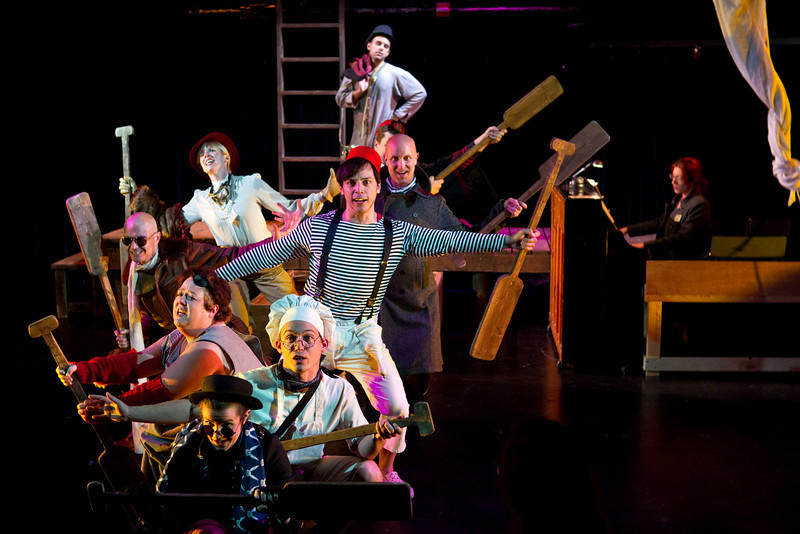
photo by Jon W. Sisson Jr
*
Saturday March 10 2012:
According to an ABC news report -
Gunns deal off, boss blames green groups -
Tasmanian logging company and would-be pulp miller Gunns
"has notified the stock exchange that potential investor,
Richard Chandler Corporation, has pulled out of its bid to buy
a 40 per cent stake in the company." This is good news for those who
feared an ecological disaster in the Tamar Valley, for there's now
a chance that Gunns will not be able to proceed with the planned pulp mill there.
Not good news, however, is the attitude of Tasmanian Labor premier
Lara Giddings, who was quoted as saying:
*
Wednesday March 7 2012:
Here's a telegram - recently unearthed by Clinton Fernandez -
sent by my brother, East Timor activist Rob Wesley-Smith,
to Andrew Peacock, Australia's Minister of Foreign Affairs,
on Dec 2 1975:
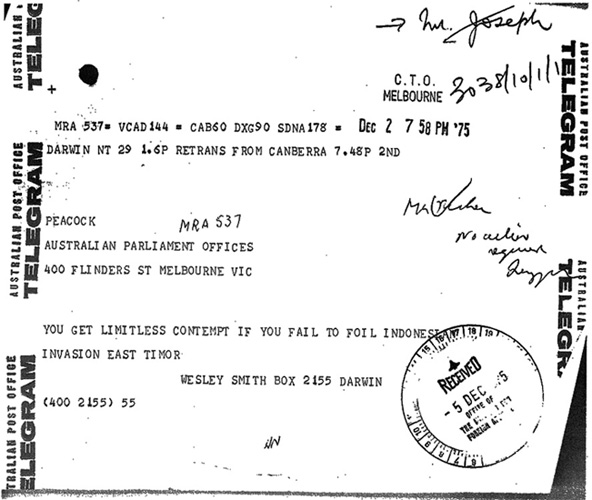
Indonesia invaded a few days later (just after US President Gerald Ford and US Secretary of State Henry Kissinger had flown out of Indonesian air-space). Note the scribbled "No action required". If Australia had taken action, perhaps the disastrous - from most points of view - Indonesian invasion and occupation of East Timor could have been averted.
*
Tuesday March 6 2012:
I'm currently reading a book called Dancing With the Devil
(Monash University Press, 2002),
by David Savage, who was a police officer in East Timor during
the 1999 referendum. He writes: "(The Indonesian police) would spin the
most incredulous stories and expect us to believe them. With hindsight
I suppose that foreign governments had for years accepted any
ludicrous account that the Indonesians would put forward, and the
troops weren't expecting us to question them as closely as we did."
(p274) There you have it: give in to them, time and time again, the
result being that they have no respect for you and feel free to continue their
murderous ways. Again, there has not been a
single conviction of an Indonesian soldier for any crime
committed in Timor between 1975 and 1999.
Timor Leste: Open
letter to all members of the Security Council
regarding justice, truth and reparation in Timor-Leste
Download: PDF
In this open letter The Judicial System Monitoring Programme (JSMP),
KontraS (the Commission for the Disappeared and Victims of Violence),
and Amnesty International write to urge the Security Council to take
immediate and effective steps to address the continuing impunity for
crimes against humanity and gross human rights violations which occurred
in Timor-Leste (then East Timor) under Indonesian occupation (1975-1999).
This is a crucial time for such action as the mandate of the United Nations
Integrated Mission in Timor-Leste is due to expire on 26 February 2012.
see here,
where you can download a pdf of the letter
*
Monday March 5 2012:
From an article titled
Fate of East Timor's stolen generation in Indonesia finally coming to light
by Lindsay Murdoch in today's Sydney Morning Herald:
Until now little was known of the fate of the children, some of whom were
abducted and others whose parents were coerced or deceived into giving them away.
Following research in Indonesia and East Timor an Australian academic,
Helene van Klinken, has published the first detailed account of the practice
she says was an example of "hegemonic power using children in its goal of
dominating the subordinate group to which the children belong".
[more]
As not a single Indonesian has been found guilty of crimes against people
in East Timor during the Indonesian invasion and occupation (1975-1999),
as a result of which 200,000 or so people died, no doubt no-one will be punished
for stealing East Timor's children ...
*
The Thirsty Night Singers did two gigs last weekend: a bracket at a
fundraiser for the refurbishment of Upper River Hall in Kangaroo Valley
(the venue for many wonderful concerts, film nights etc), and a bracket
at a birthday party in Berry. We're now having a short break before
continuing to learn new repertoire and auditioning new singers.
*
Sunday Febuary 26 2012:
In the early 80s I bought, for the Sydney Conservatorium of Music, a Fairlight
CMI ("Computer Music Instrument"), using it for such pieces as
For Marimba & Tape, White Knight & Beaver
and Snark-Hunting. In 1986 I took one to China as a gift
from the Australian government, installing it at the Central Conservatory
in Beijing and teaching local composers how to use it (at the time I was
dubbed "The Father of Chinese Computer Music", but I suspect that someone
else has now claimed that title). A few years after that, Fairlight Instruments
went belly up. Just recently, however, Peter Vogel, who was one of the
geniuses behind the machine, has put together a 30th anniversary machine called
the CMI-30A. Check it out
here.
The other day I was reading the Fairlight Forum, and came across an article by
Tom Stewart, a student at the Con at the time, in which he describes the
genesis of the voice ARR1.VC, which he created in the Con's Electronic Music
Studio with his girlfriend Sarah:
Background
[more]
Tom explains that ARR1 went viral, with other manufacturers blatantly using
it in their products. It's a breathy sound, a touch of pan flute mixed with traces of
a female voice (you've heard it many times, even if you didn't realise it
at the time). I remember first hearing it in the Studio; after that it seemed
just a few weeks before it was in just about every film score, every jingle,
and a lot of pop records. I don't think Tom ever made any money out of what was a
magnificent achievement, although he did get a job with Fairlight partly, I suspect,
as a result.
On the original CMI and on the IIX model, there was a software package called MCL
("Music Composition Language"), which for some entailed a tedious way of getting
music into the machine. Hence it was not popular, the legendary Page R
garnering all the attention. But MCL enabled a composer to achieve things that
were either very difficult or impossible to achieve with other sequencers, and
hence it was popular with so-called "serious" composers like me. Alas, the
16-bit Fairlight CMI Series III abandoned MCL, as has the CMI-3A. If I can find
an external MIDI sequencer that gives the control that MCL was able to, I will
start saving for the new version of The Legend!
*
I recently went to a concert in the Sydney Opera House by a cappella group
The King's Singers. I've been a great fan since they began, but while they
sang superbly, and I enjoyed it enormously, I had the odd criticism of the concert:
By all means sing some madrigals, I say. But don't open the program with eight
of 'em, some quite long and in Italian or Spanish, sung without amplification
in the cavernous Concert Hall of the Opera House. I was a few rows from the front,
yet I had to strain to hear. Why not subtle amplification to give the music a presence
that it simply doesn't have in that space? Aaaah, the purists say, in their ignorance,
you'll destroy the integrity of the listening experience, or something similar.
Never mind that most people these days hear music up close and personal, in their face,
pumped directly into their ears, and that six choristers, singing softly,
are always gunna sound tiny and tinny in that place. I bet that when the madrigal
section of the concert was over, most people breathed a sigh of relief:
Phew! That's the 'serious' side out of the way - now we can enjoy ourselves.
Don't get me wrong: I generally love madrigals. It's just that their time and place
is not eight in a row at 8pm on a Thursday night in the Concert Hall of the Sydney
Opera House at $112 per ticket with no amplification. Perform them in a small
specialised venue somewhere singing to afficionados. And not very often. I mean,
there's an enormous amount of good contemporary music not being sung, not getting
a look in, while the K's S sing, again and again and abloodygain, like lots of
other groups do, 16th century stuff from the museum.
Then we heard Greensleeves. Excuse me? That's Mr Whippy's song.
Can't we have something a tad more interesting? Next: Danny Boy.
Now I happen to think that that is a most beautiful song, despite it being
crooned by just about every pop singer since Bing Crosby. In fact I recently
arranged it for the Thirsty Night Singers, partly 'cos the melody was collected
in a town - Limavady - in Northern Ireland where my paternal grandmother was born.
But, again, there is more interesting stuff in the K's S' vast repertoire.
Then Dance to thy daddy, which was a promotion for a recent CD of theirs.
Nice song nicely arranged, but nothing more than that. Then Botany Bay
(we'd better give 'em some of their own - that'll keep 'em happy).
But there is Australian stuff
that's much more interesting, and which they could sing much better, than Botany Bay.
The next sop was The Band Played 'Waltzing Matilda'.
Magnificent song, but I found myself wishing for
Roland Peelman's
arrangement ...
Interval. Then Elena Kats-Chernin's River's Lament. In a serious
concert of contemporary music in an appropriate venue, this piece would've fitted
right in. But in this concert it was yet another piece delaying what most people
came for: "close harmony". In four movements, it was far too long for this concert.
Not Elena's fault, of course. It was ignorant, unintelligent programming.
They should've commissioned a 5' piece. The piece itself set words, by
American writer
Charles Anthony Silvestri,
about a river. It was an enjoyable piece of earnest new music.
Elena is, after all, an excellent
composer. But while I admire the K's S for commissioning a local work, its idiom and
length weren't appropriate for this concert, the group's first in Sydney in 27 years.
I got the sense
that most people in the audience merely politely sat through it as they waited for
... wait for it ... "close harmony"!
By then there was time for about four songs. A couple of Beatles' songs
(Penny Lane and, would you believe, Obladi, Oblada -
I mean, probably the least interesting song of the Beatles' entire catalogue),
a couple of other things that I can't remember, but no real "close harmony",
and suddenly it was all over. Three encores, and exhortations to go out and
buy their CDs and give them yet more money. The audience loved them,
but [a] of course they did: they'd paid $112 and weren't gunna admit that
they'd done their dough; [b] the group is famous, and is from overseas,
so it must be good; [c] the group is fabulous, doing what they do very well,
and [c] they didn't know what could've been. I loved 'em too, 'cos I'm a fan
and have been forever. Their intonation, ensemble, balance etc
are exquisite. But I do know what could have been: an intelligently-chosen,
better-balanced program that worked on many levels and which could've turned
a nice night out into a great night out. Their spoken introductions were
generally stilted, amateurish. While this had some charm to it, for $112
I expect something a little more professional. And a decent informative
printed program! The one we got was pathetic. And the bass's mother would
have been appalled had she seen his hair.
Anyhow, that's what I think. I suspect that I don't have a career
as a music critic coming up ... No sour grapes in there, incidentally, although no doubt
I'll be accused of 'em.
*
Talking of vocal groups, I was asked the other day to write a short article
about the group I sing in and, sort of, direct, The Thirsty Night
Singers:
In 2007 a bunch of singers who'd been in the Courthouse Choir in Berry
decided to form a smaller, Kangaroo Valley-based group.
Various songs and styles were tried, people came, people went,
till eventually a regular seven-member line-up had established itself.
They rehearsed on Thursday nights - hence their name.
At the beginning of 2010 soprano Alex Holliday, who left to start a family,
was replaced by Nadia Intihar. Other members of the group are
Nell Britton (soprano), Janette Carter and Patsy Radic (altos),
Martin Wesley-Smith (tenor), and Peter Morgan
and Peter Stanton (basses).
The Thirsties sing without
instrumental accompaniment. Their eclectic repertoire includes traditional songs
(e.g. A-Rovin'), contemporary folk-songs (Hey Ho Cook and Rowe),
jazz songs (When I Fall in Love), political songs (about East Timor,
West Papua, and the Stolen Generation), kids' songs (Shut the Gate),
and pop (including several Beatles songs and
Queen's Bohemian Rhapsody, which has become the group's
pièce de resistance).
Martin Wesley-Smith does some of the musical arrangements.
He also modifies existing arrangements to suit the Thirsties' voices.
In 2008 he and his librettist brother Peter Wesley-Smith composed a piece
called Seven Widows at the Gates of Sugamo, for choir and an ensemble
of seven harps. In 2009 the Thirsties recorded it with
SHE (Seven Harp Ensemble)
in a local recording studio for local record company Tall Poppies.
It is available on a CD called Bolmimerie (TP204).
While the group does not generally seek out gigs, it has done various concerts,
including private functions, performances in Canberra and Sydney,
at River Music in Nowra,
and at the Kangaroo Valley Folk Festival. They are widely regarded as one of
the finest seven-member a cappella vocal groups currently based in
Kangaroo Valley.
Recently, Nell announced that she will be leaving the group before the
end of the year, meaning that we're looking for a new soprano ... Here's a
recent photo of the group as it is:

l to r: Patsy Radic, Janette Carter, Peter Stanton, me, Nell Britton, Nadia Intihar & Peter Morgan
*
Tuesday Febuary 14 2012:
My Resident Lyricist Peter Wesley-Smith (and Spare Tenor
in the Thirsties) has written a poem
especially for today:
I'm reminded of a poem that I read in a Bluey and Curly cartoon when I was a kid and have remembered ever since. A lonely lovelorn cowhand has written a poem to his loved one:
In 1988 I was commissioned to compose a large choral piece for the Intervarsity Choral Festival of that year. It was Australia's Bicentennial - two hundred years of white settlement - and I wanted to do a piece that looked at Australian society from different angles, some nostalgic, some loving, some critical ... This poem seemed to fit right in. I set it to music, then sought permission to use it in the piece. Well, after a long process, during which executives of The Herald and Weekly Times, which owned the copyright in the Bluey and Curly cartoons, went through every one they'd ever published - but couldn't find it. Someone else must own the copyright, but I now have no idea who does or where I got it from. The song went into the piece - Songs of Australia - with a note asking any aggrieved copyright owner to get in touch (no-one has). Here's the melody: 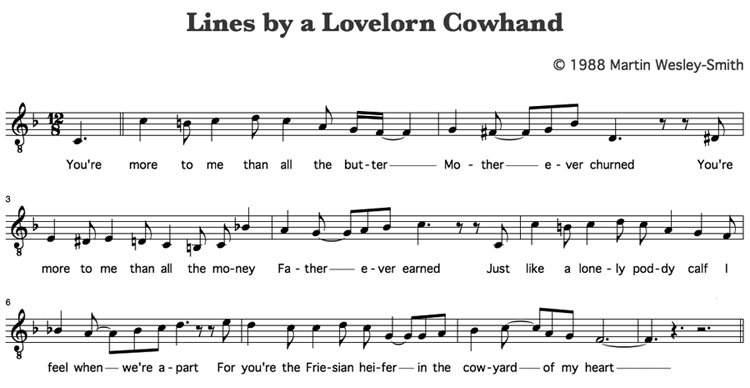
A version exists for six voices, sung by The Song Company.
*
Friday Febuary 3 2012:
English composer and one-time coleague of mine Jonathon Harvey has
motor neurone disease and is in the final stage of his life - see this article
in The Guardian (UK):
Jonathan
Harvey: Touching the Void
by Tom Service.
*
Sunday January 29 2012:
American William Blum is one of my favourite critics of American
foreign policy. In an article
called Iraq. Began with big lies. Ending with big lies. Never forget
(Information
Clearing House, Jan 03 2012) he noted
[more]
It's hard to see that the people of Iraq are better off now than they were before the USA
and its allies, including Australia, told great big lies and invaded their country.
*
Tonight in Chicago there is a reunion of everyone involved in the brilliant November 2010
Chicago Opera Vanguard
production of my piece Boojum!.
I would love to be there!
*
Friday January 27 2012:
click on photos for larger versions
*
Tuesday January 03 2012:
music and politics:
It's an old story, but for some reason there was a reference to it on my facebook page
this morning: it's
Krystian Zimerman's shocking Disney Hall debut, in the Los Angeles Times, April 27 2009:
About 30 or 40 people in the audience walked out, some shouting obscenities. "Yes," he answered, "some people when they hear the word military start marching."
Others remained but booed or yelled for him to shut up and play the piano. But many more cheered. Zimerman responded by saying that America has far finer things to export than the military, and he thanked those who support democracy ...
[more]
Those who walked out have no problem with music that supports, directly or implicitly, the status quo. It's when it presents a contrary view that we hear that "music and politics don't mix!"
*
In Seize the Chance to End the Craziness in North Korea (Information Clearing House, Jan 1 2012)), Eric Margolis writes:
North Korea keeps asking the US to sign a non-aggression pact in which Washington pledges not to attack the North. The North's modest nuclear program is mainly to deter a US attack by threatening a counter-strike on South Korea, Japan and Okinawa.
Washington has long refused such a pact. Instead, it has ringed North Korea with military forces and imposing a punishing trade embargo that has played a major role in keeping the North in dire poverty. The US says North Korea's regime is brutal, illegitimate despotism with which it will only deal with the greatest reluctance and disgust.
Yet the US supports many nasty dictatorships around the globe, such as Uzbekistan and Ethiopia. If the US really wants to end North Korea's nuclear program, the solution is to sign a non-aggression pact and end US trade sanctions.
Both the US and South Korea should end their provocative military war games on North Korea's borders. Such posturing led to last year's military clashes.
North Korea will have to end its nuclear program, agree to cease threats against neighbors that are a form of financial blackmail, reduce the size of its huge armed forces, move them away from the DMZ, and divert resources to feeding its people ...
[more]
A reader, Izrael Finklestein, responds:
Saddam Hussein didn't have weapons of mass destruction but pretended he did so that his enemies would not attack him. They attacked him anyway.
*
Sunday January 01 2012:
A new year, a new blog ... For my 2011 blog, click 2011. Come back here in a few days' time for news, rants etc.
|
| top | 2011 | 2010 | 2009 | 2008 | 2007 | 2006 | 2005-1999 |
Martin Wesley-Smith's home
page
e-mail: mwsmith@shoalhaven.net.au
